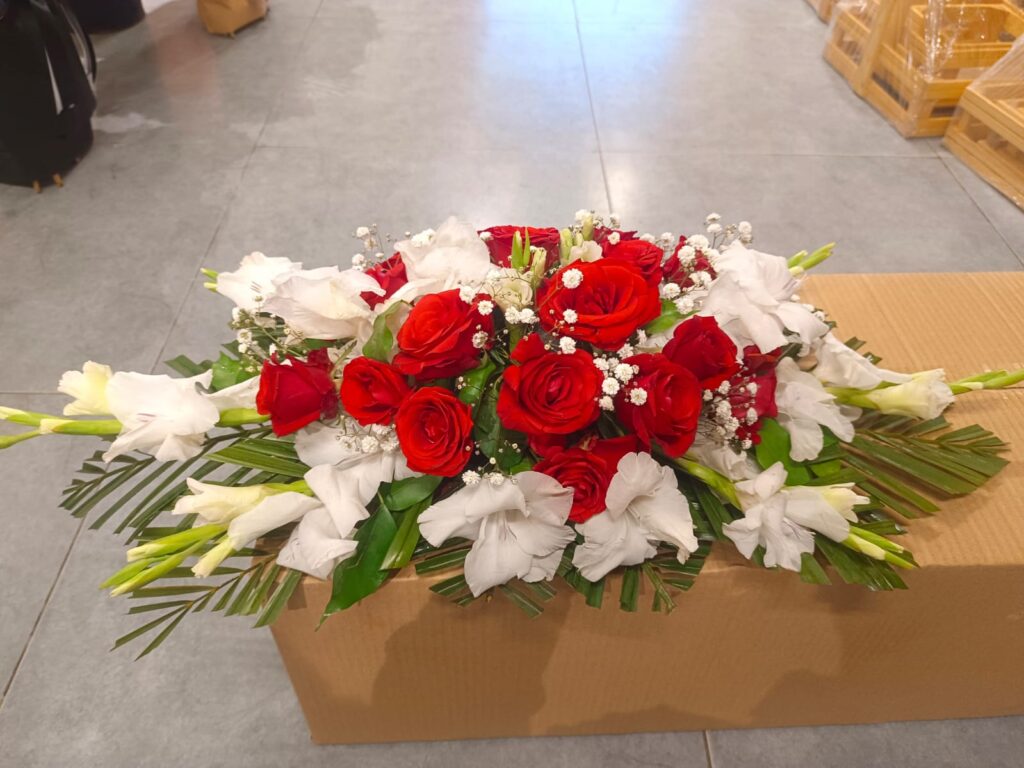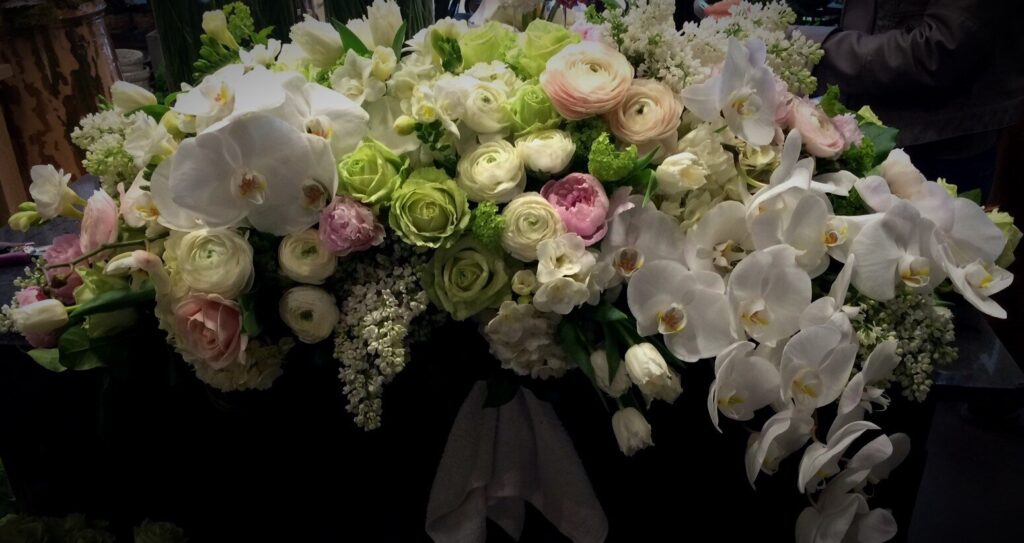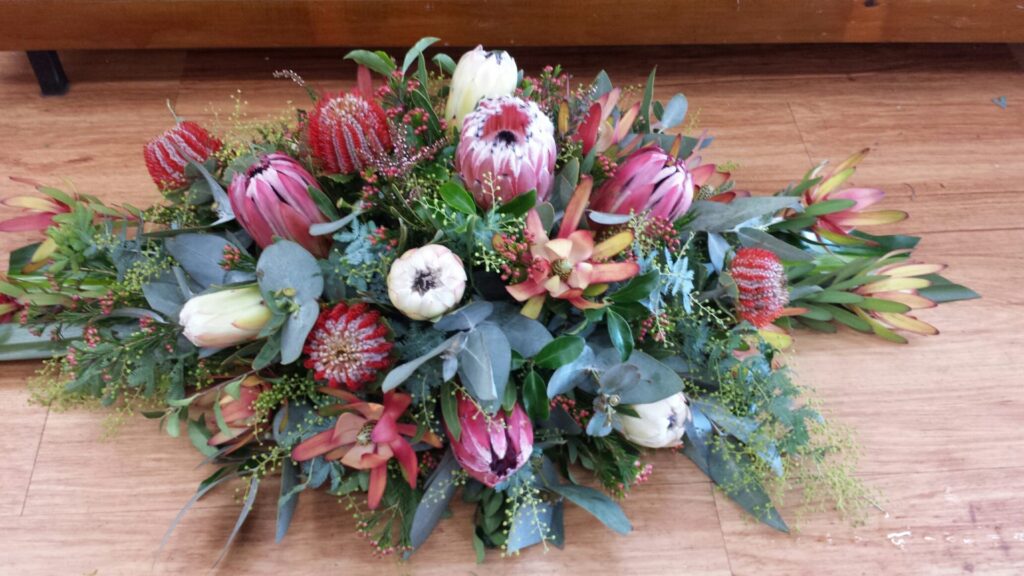In times of grief and loss, funeral flowers can provide comfort and solace to both the bereaved and those paying their respects. The choice of funeral flowers can be a deeply personal and meaningful decision, as they serve as a lasting tribute to the deceased. Understanding the symbolism behind different types of flowers and considering factors such as the deceased’s preferences and religious or cultural traditions can help guide you in choosing the most appropriate funeral flowers.
Understanding the Symbolism of Funeral Flowers
Funeral flowers have been used for centuries to convey emotions and messages of sympathy. Each flower carries its own symbolism, making it important to select flowers that reflect the sentiment you wish to express.
When choosing funeral wreaths, it’s not just about the type of flower but also the color that holds significance. For example, while red roses symbolize love and respect, pink roses can represent gratitude and admiration. Yellow roses, on the other hand, symbolize friendship and joy, making them a thoughtful choice to celebrate the life of the departed.
The Meaning Behind Popular Funeral Flowers
Roses, lilies, and carnations are commonly associated with funerals. Red roses symbolize love and respect, while white roses represent purity and innocence. Lilies are often associated with funerals as they symbolize the innocence and restored innocence of the departed. Carnations can convey feelings of love, remembrance, and admiration.
Aside from the traditional funeral flowers, certain blooms hold unique meanings that can add a personal touch to your floral arrangement. For instance, forget-me-nots symbolize everlasting memories, making them a poignant choice to honor the memory of a loved one. Irises, with their striking beauty, can symbolize hope and faith, bringing comfort to those mourning the loss. Learn more about unique mother’s day flowers to surprise and delight.
Cultural Significance of Funeral Flowers
It’s essential to consider cultural customs and traditions when choosing funeral flowers. For example, in Asian cultures, chrysanthemums are often used at funerals, symbolizing honor, respect, and well-wishing. In Hindu traditions, marigolds are commonly used as they are believed to guide the soul to the afterlife.
Understanding the cultural significance of funeral flowers can help ensure that your floral tribute is not only beautiful but also deeply meaningful to those who share in the mourning process. By incorporating flowers that hold special meanings across different cultures, you can create a tribute that transcends language and customs, offering solace and support during a difficult time.
Factors to Consider When Choosing Funeral Flowers
When selecting funeral flowers, it’s crucial to take into account the deceased’s preferences and honor their memory. Consider the following factors:
Considering the Deceased’s Preferences
If the deceased had a favorite flower or color, incorporating them into the floral arrangements can be a beautiful way to pay tribute to them. It shows thoughtfulness and personalizes the tribute.
Additionally, you may want to consider the significance of certain flowers. For example, lilies are often associated with funerals as they symbolize the restoration of innocence for the departed soul.
Taking into Account Religious or Cultural Traditions
Religious and cultural traditions may dictate specific flowers or arrangements that are considered appropriate. It’s important to respect these customs and choose flowers accordingly.
For instance, in some cultures, white flowers symbolize purity and peace, making them a popular choice for funeral arrangements. Understanding these symbolic meanings can add depth and significance to your floral choices.

Different Types of Funeral Flower Arrangements
There are various types of funeral flower arrangements, each with its own significance:
Wreaths, Crosses, and Hearts: What They Represent
Wreaths symbolize eternal life and are often placed on the casket. Crosses represent faith, while hearts convey love and affection.
Wreaths, with their circular shape, are a symbol of eternity and continuity. They are often made with a combination of flowers and greenery to represent the cycle of life and death. Crosses, on the other hand, are a powerful religious symbol that signifies the deceased’s faith and the hope of resurrection. Hearts, with their loving shape, express the deep affection and connection shared with the departed.
The Significance of Casket Sprays and Standing Sprays
Casket sprays are larger floral arrangements that cover the casket, expressing love and respect. Standing sprays are freestanding arrangements displayed near the casket, providing beauty and remembrance.
Casket sprays are often chosen by close family members as a grand tribute to the deceased. They can be customized with the favorite flowers of the departed or designed to reflect their personality. Standing sprays, placed near the casket, serve as a focal point during the service and offer a comforting presence for mourners. These arrangements can vary in size and design, from traditional to contemporary, offering a personalized touch to the funeral setting.

Personalizing Funeral Flowers
Adding a personal touch to funeral flowers can make them even more meaningful:
Funeral flowers serve as a beautiful tribute to honor and remember a loved one who has passed away. They offer comfort and solace to grieving family and friends, symbolizing love, respect, and sympathy during a difficult time.
Incorporating Favorite Flowers or Colors
Incorporating the deceased’s favorite flowers or colors can create a personalized tribute that reflects their personality and passions. Whether it’s a vibrant display of sunflowers symbolizing joy and positivity or a delicate arrangement of lilies representing purity and peace, choosing flowers that held special meaning to the departed can add a heartfelt touch to the funeral service.
Furthermore, selecting colors that were beloved by the deceased can enhance the personalization of the floral arrangements. Whether it’s a pop of bright red roses signifying love and courage or soft pastel hues conveying serenity and grace, incorporating these favorite colors can create a visual representation of the individual’s unique spirit.
Adding Personal Touches to Flower Arrangements
Consider adding personal touches, such as photographs, small mementos, or handwritten notes, to the floral arrangements. These elements can evoke fond memories and create a unique tribute. A cherished photograph of the departed nestled among the blooms can serve as a touching reminder of special moments shared, while a handwritten note expressing love and remembrance can convey heartfelt sentiments.
Small mementos, such as a piece of jewelry or a treasured keepsake, can also be delicately incorporated into the flower arrangements, adding a personal touch that speaks to the individuality of the departed. These thoughtful additions not only personalize the floral tributes but also create a lasting memorial that celebrates the life and legacy of the loved one.
Etiquette for Sending Funeral Flowers
When sending funeral flowers, it’s essential to follow proper etiquette. Consider the following:
When and Where to Send Funeral Flowers
It is customary to send funeral flowers to the funeral home or the location where the service will be held. Timing is also crucial, as it’s best to send flowers a day or two before the service.
Appropriate Messages to Include with Funeral Flowers
A thoughtful message accompanying the funeral flowers can provide comfort to the grieving family. Keep the message simple yet heartfelt, expressing your condolences and support.
Choosing appropriate funeral flowers is an act of love and respect. By understanding the symbolism, considering the deceased’s preferences and traditions, and personalizing the floral arrangements, you can create a lasting tribute that honors their memory and provides solace to those mourning their loss.
When selecting funeral flowers, it’s important to consider the cultural and religious background of the deceased and their family. Different cultures have varying traditions and symbolism associated with flowers, so it’s thoughtful to choose blooms that align with these beliefs. For example, lilies are often associated with funerals in many Western cultures, symbolizing purity and the restored innocence of the soul.
Moreover, the color of the flowers can also convey different meanings. White flowers are commonly associated with purity and peace, making them a popular choice for funeral arrangements. On the other hand, red flowers may symbolize love and courage, while pink flowers can represent admiration and grace. Selecting the appropriate color scheme can add a deeper layer of sentiment to your floral tribute.

